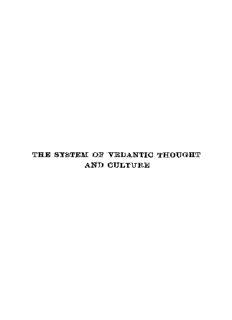
the system of vedantio thought and culture PDF
Preview the system of vedantio thought and culture
THE SYSTEM OF VEDANTIO THOUGHT AND CULTURE THE SYSTEM OF VEDANTIC THOUGHTANDUULTURE BY :MABENDRANA'l'H SIRCAR, M.-1., Pn.D.• PROFESSOR OF PHILOSOPHY, SANSKRIT COLLEGE, CALCUTTA PUBLlSHED BY 'l'RE UNIVERSITY OF CALCU'l''l1A 1925 PRINTED BY BBUPBNDBALAL B4NBBJBB AT TBB CALCUTTA UNIV1Ul8IT1' PUSS, SBNATB BOUSB, C.li.CUTl'A Reg. No. JSB, Maroh,l925-250. To 1 he Memory of my Father, PREFACE: In the following pages I have made an bumble attem_ptc, to present the system of Adwaita Yedantism both in its theoretical conception and practical bearing. Vedantism _ is an integral system and in writing these pages the end in view has been to present the system in as complete a form as possible. I have not confined myself to the philosophy of the Upani~ads. Nor have I limited- my search to Gau~apada and Sankara. I have also brought in the evolution of the N eo-Vedantic thought after Sankara. Philosophy in India has never been solely an intellec tual discipline. It has ever been the highest art of life. This is certainly true of ancient Vedantism. Though in later Vedantism the demand of conceptual thinking has been satisfied, still Vedantism has never cut itself adrift from its ancient mooring, the art of realising transcendent bliss. I take this opportu!lity of conveying my sense of deep obligation to Mahamahopadhyaya Pr~mathanath Tarkabhusan, and Mahamahopadhyaya Lak~ma!f Sastri, formerly Professors of Vedanta, Sanskrit College, and Pandit Auantakri~I,Ja Sastri of the Calcutta University for the valuable help I received from them. My heartfelt thanks are due to my colleagues, Professor Syamacharan Mukerjee, M.A., and Professor Kri~I,Jadhan Banerjee, M.A., and my friend Babu Cbarucbandra-Biswas, M.A., B.L., Vakil, .High Court, who kindly went through the proofs. I have also to thank Babu Upendra Coomar viii PREFACE Bose, the Librarian, Sanskrit College, for the readiness with which he placed at my disposal the rare books and manuscripts of the Library. My acknowledgment of services rendered by others will be incomplete if I do not include the name of Sir Asutosh Mookerjee, ol revered memory, who kindled in scholars a spirit of research and creativeness. Ba&anti Pancami, 1925. CONTENTS CHAPTER I BEING The problems-Truth, absolute and relative,-absolute negation, an impossibility-absolute, not a multiplicity, not a system, not becoming-hheda, its kinds-Being and consciousness, Mystic experiences- unmani, Being and Bliss, Being incogitable, Vedantism and Agnosticism-the axiom of Identity. CHAPTER II AP l'EARANCE Reality and appearance-Brahman transcendent and Immanent-Kutastha-three stages in the conception of Brahman-Sarbajnatmuni on Parinam" and rivartha-· Being, non-being and becoming-Vedanta and Spinoza Lila-Maya, Nescience or .Avitlya-.Adhyasa-A.nirbacaniya khyativada, A.satkhyativada, A.khyativada, A.tmakhyativatla, Anyathalhyativada, Satkhyativatla, .Alaukikakhyativatla, kinds of .Adhyasa-lllusory existence-Yyavaharik, Prati- 6hasik,-Ajnana, its locus-.Tiva or Brahman-Yacaspati and Prakastman-Causation, Yetlantic, Buddhistic, Naiya yika, Sankhya conception-Ramanuja'a charge, its refu tation-Yacaspati on causation-Brahman or Maya, the material cause--different views-Vedanta, Kant, Hegel; Bradley eompared-Exoteric conception of Brahman-the cosmological, the teleological, the moral principle-theology lost in metaphysics-the different senses of Maya and .J.vidya-.Abara'T)a and BikfJepa-18wara as Jiva-the CONTENTS conception of Jiva, the psychological self-the doctrines of AMasa, Bimba-Pratibimba and Abaccheda. CHAPTER III CosMOLOGY AND PsYCHOLOGY OF VEDANTA Evolution in Upanisads and later Vedantism-Bik~atta and Adri~ta-Adri~ta Sr£E}ti or Srif}ti-JJrif}ti-IJristi-Srif}ti -the picture of creation-the order of Cosmic Evolution Panciltaratta-and Tribitkaratta-the planes of existence the origin of Body-Prana-five Pranas and five organs of ·action-conscious life, sense organs-Yedanta and Miman sa on sense organs-organs of relational-consciousness, antahkara'!la-mental functions and their localisation-five fold sheath-Hirpyagarva, Taijas, lsvara, Prajna-Sakf}i witness-consciousness-witness as Jiva-Brahman as witness -normal states of Jiva-consciousness-Deep sleep, its analysis-analysis of dream-consciousness-two theories Presentative and Representative-sources of knowledge-_ Perception, Inference, Upamana, Artltapatti, Armpalabdlti Authority and Pel'ception, their respective province analysis of Perception-Indeterminate and Determinate analysis of the perceptual process-External Perception, lutemal Perception: Yritti-Perception of Jiva and bwara -Swarupat!l Pratakf}a and Falata Pratakf}a-Yritti, its different conception-Functions of Yritti-Inference- Svartha and Parartha-1'yapti-how is it established Carvaka, Buddhist, Naz!Jai!ta, Yedanta on Yyo.pti-Opera tion of Yyapti in Inference-Li11ga paramarsa-In£erence Pa1·artlta-Upamana-Arfltapatti-and Praval&ara and Yedanta on Artltapatti-Agama-Terms and connotation Anflita-A.vidhana-Aviltita ant1aya-its application on the u:iom of Identity-A.nupalabdhi-Abltava. CONTENTS Xl CHAPTER IV CuLTURE Realisation-Direct and Indirect ways-three stages in Progressive Evolution-Devotion, its forms-Two forms of transformation-Sinking and Expansion-obstacles to knowledge-preliminary discipline-physical, mental and moral-Karma, its bearing on knowledge-Jnana-Karma Samuccaya and its refutation-Forms of Renunciation Sraba?t, iJ1anan, Nididltyaaan-Samapatti : Samprajnat, · Aaamprajnat,-8ul}ttpti and Samadlti-two stages in Nirvi kalpa-Indirect method-three forms of worship-P,·atik, Sampat, Altamgralta-Medium of worship-Om-Gayatri -comparative importance of Sraba'(l-, Manan,-Nidi dltyaaan,-Yivarana, Yacaapati-the bearing of Sabda on know ledge-'-Y acaapati and Yivarana-Vedantism is not Pessimism-Free will and Free being.-Karma and its divisions-0 race. CHAPTER V REALISATION AND FREEDOM The true meaning of self-knowledge-Bondage or Freedom attributed to Jiva, and not. to Atman-knowledge of Atman as distinguished ft·om knowledge of things-Falava pyatva and Yrittivapyatva-Destruction of Ignorance-its me9ning-Freedom-Types of Liberation-P'ideh Mukta, Jiva11 M ukta-P'idvat Sannyaaa-Ji aaiatha' a distinction between a Jivan Mukta and a P'ideh Mdta-Types of Jivan M1tkta-Duties of Jivan Mukta-l'aaiatlta'a seven stages of knowledge-Liberation, different conceptions. ERRATA. Page Line ReaiJ For 4 2 " oneself " " himself." 33 19 "reveal" 11 revea." 61 18 read the last word as "yonder." 71 10 read the first word as "Identity." 71 10 read the last word as "conceive." 71 12 "like" "ike." 72 1 " the outer and the inner " " outer ~nd inner.,' 101 12 " is " " ie." 101 10 read " although all divisions " "although and the whole all divisions." 106 •. ..16 "Epistemological " "Epistonological." 109 18 "theory" "the ry." 112 8 "known" "knowing." 121 l " originate " "originates." 126 s "maintain '' "maintains." 15S 1 " Prajlia" " Pragna." 173 4 "are" "arc." 178 4 "establishes " " establish." 191 l7 " covering " " cov ing. " 248 8 " Asa.mprajiia.t" "Asampragnat!' 248 foot-note, 1st line " Nirvika.lpic " " Nirvikalpie!' 257 16 " ceaseless " "ceaseless.'' 260 22 "object" "objsct." 270. 19 " existence " " xistence." 284. 13 "cannot" "connot" 288 12 " Videhakaibalya " " Vidahkaibalya." 289 23 "are" " is." 295 2·,'. "life " "life." . 801 4 "led" " let."
Description: